The 5 Best Vegetables to Plant for Beginners, Experts Say
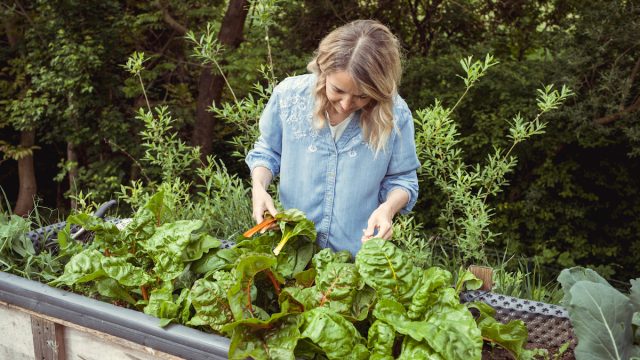
Nothing is quite like a fresh-picked, juicy tomato in the summer. Sure, you can head to your local farmer’s market for this, but there’s something special about enjoying the fruits of your own labor. Even if you’re a bit of a green-thumb novice, gardening experts say there are plenty of vegetables that are easy for beginners to plant. Curious to know more? Keep reading for their top recommendations. You’ll be sharing veggies with your neighbors in no time.
READ THIS NEXT: The 6 Best Herbs to Plant for Beginners, Experts Say.
1
Leafy Greens and Lettuce
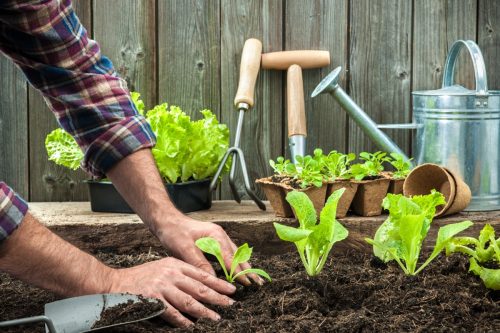
According to Erinn Witz, a garden expert and co-founder of Seeds and Spades, lettuce and leafy greens are great for beginners because they’re very low-maintenance. “As long as you water them often, they’ll grow pretty well in most soil conditions and are fairly resistant to pests and disease.”
Plus, as Ben Hilton, founder and editor at The Yard and Garden, notes, they’re fast-growing and can be grown in pots or in the ground, depending on your setup.
You can also grow lettuce in the spring or fall, Hilton says, as it prefers cooler temperatures and can tolerate partial shade. He recommends the Romaine, Crispino iceberg, or Lollo varieties.
As for other leafy greens, Witz says Swiss chard and kale are good choices for beginners.
2
Sweet and Hot Peppers
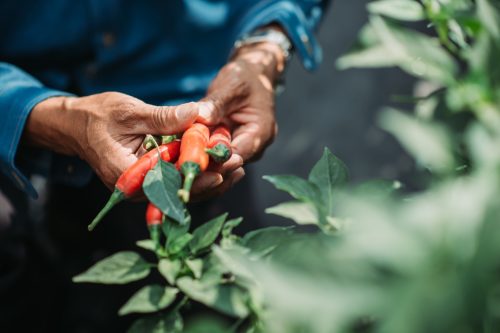
Peppers are the first “vegetable” on this list that are actually fruit, as technically anything with seeds falls into the latter category. However, because of their lower sugar content and savory flavor, nutritionally and colloquially most of us think of them as vegetables.
Peppers can be tricky to start from seed, but planting seedlings (a very young plant) is a wonderful option for novice gardeners. “All they need is a sunny spot where they’ll get at least six hours of sunlight daily, well-draining soil, and regular fertilizing,” Witz says.
Each pepper plant can produce multiple fruits during the growing season (another benefit for beginners who may have planted a little too early or late), so Hilton says that you should be prepared to stake these plants “to support branches heavy with fruit.”
Hognose pimento peppers, Purple Belle bell peppers, and banana peppers are a few easy-to-grow options, Witz shares.
READ THIS NEXT: This Is the One Weed You Should Never Pull, Experts Say.
3
Tomatoes
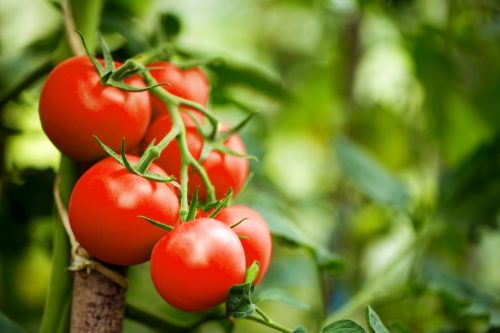
Tomatoes (another veggie that is actually a fruit) are one of the most common additions to any vegetable garden. “They are relatively easy to grow and have a high yield,” notes Hilton. They can also be grown in a variety of climates, so they’re more tolerant to temperature fluctuations than other plants.
This is another plant that you’ll likely need to stake when the fruit gets heavy; circular tomato cages are also a popular option. In addition to support, tomatoes need plenty of sun and water, advises Hilton.
4
Radishes
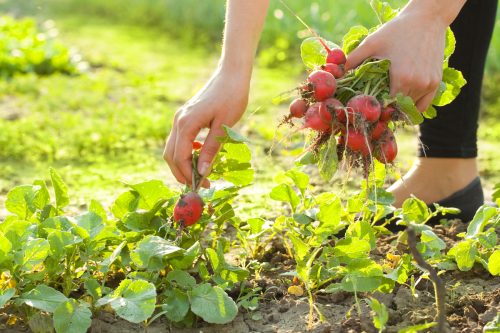
If you’re antsy to get growing, Hilton says radishes are one of the fastest-growing vegetables. “They can be grown in nearly every season, and they thrive in cool weather,” he adds.
According to the Old Farmer’s Almanac, radishes can actually be beneficial to your entire vegetable garden, as they help deter pests from other plants. You’ll just want to ensure they’re getting at least six hours of sun a day and that you aren’t allowing them to dry out.
For more gardening advice delivered straight to your inbox, sign up for our daily newsletter.
5
Zucchini

Have you ever had a neighbor knock on your door, trying to bestow upon you some of their home-grown zucchini? If not, you may have heard jokes about such instances since “these plants produce an abundant harvest with little effort on your part,” explains Wintz.
“Zucchini plants can get large—up to about three feet wide—so give them plenty of space, generous watering, and some fertilizer from time to time,” she recommends.
She suggests Black Beauty zucchini for beginners (these are actually the green zucchini you see commonly). One tip is to pick them often; not doing so will slow down their growth.